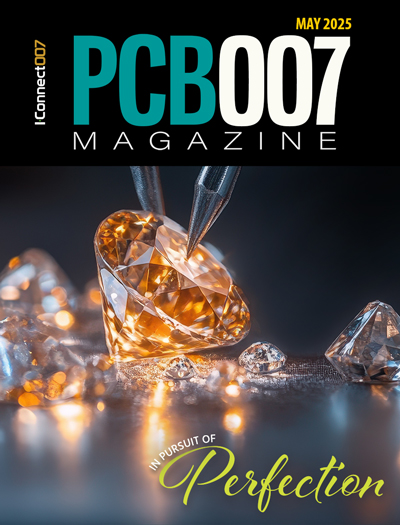-

- News
- Books
Featured Books
- pcb007 Magazine
Latest Issues
Current Issue
The Hole Truth: Via Integrity in an HDI World
From the drilled hole to registration across multiple sequential lamination cycles, to the quality of your copper plating, via reliability in an HDI world is becoming an ever-greater challenge. This month we look at “The Hole Truth,” from creating the “perfect” via to how you can assure via quality and reliability, the first time, every time.

In Pursuit of Perfection: Defect Reduction
For bare PCB board fabrication, defect reduction is a critical aspect of a company's bottom line profitability. In this issue, we examine how imaging, etching, and plating processes can provide information and insight into reducing defects and increasing yields.

Voices of the Industry
We take the pulse of the PCB industry by sharing insights from leading fabricators and suppliers in this month's issue. We've gathered their thoughts on the new U.S. administration, spending, the war in Ukraine, and their most pressing needs. It’s an eye-opening and enlightening look behind the curtain.
- Articles
- Columns
- Links
- Media kit
||| MENU - pcb007 Magazine
From Trend to Game Changer: Which Technology Will Make the Cut?
September 13, 2018 | Barry Matties, I-Connect007Estimated reading time: 6 minutes
At the recent EIPC Summer Conference, Hans Friedrichkeit of the PCB Network gave an engaging presentation on artificial intelligence and future technologies, which was well received by attendees. Who better than Hans to offer insight on which future megatrends might truly become game changers? Publisher Barry Matties sat down with Hans to get his take on trends such as 5G, autonomous cars and 3D printing.
Barry Matties: Hans, please begin by sharing little bit about PCB Network and your background.
Hans Friedrichkeit: I founded PCB Network near Basel/Switzerland in 2002. We are a a consulting firm focused on strategic business development, as well as company ratings and damage reports as official expert witness. Also we are advisors to companies in the electronics industry. Before that, I was running a PCB company for 20 years—PPE, which, at the end, was at $150 million and close to 1000 people. The company was focused on HDI boards already at the end of the nineties and the first western PCB company who did flip chip on organic substrates in mass production. Today, the main factory is part of Wuerth electronic group.
Matties: Wow, that is a nice shop to run. You learned quite a bit there, no doubt. But today you were giving a presentation about the future.
Friedrichkeit: Yes.
Matties: And one of our upcoming issues is looking at megatrends, and the reason that we even considered looking at this topic is because we were going to so many trade shows and the optimism in the industry was everywhere. So we asked, "Well, why are you so optimistic?" Some people said it was the economy, some people said it was 3D printing, but some referred to megatrends that are going on, which includes a lot of what you were talking about with AI and that sort of thing.
Friedrichkeit: Many megatrends already influence our lives today, like artificial intelligence or autonomous driving, or even up to now the simple lighting in the automotive. Like I said this morning, for around 105 years we only had stupid front lights. You could switch them on and off and you had either a bright light or low light and that was it. Today, we see LED technology with a camera-image processing-control unit driver-led for glare-free front lights, presently up to 128 LEDs per light. It's much, much more than a stupid bulb. It's really a fully electronic system. As you have seen today in some presentations, companies like Mektec, the largest flex circuit manufacturer in the world, are concentrating in Europe on the “LED matrix light,” because there is a high growth rate. Presently, it's only on premium cars, but in the future, it will step down to the average car.
Matties: When you look at megatrends, what do you consider a trend that is going to change society?
Friedrichkeit: Autonomous driving will change society for two reasons. People today say, "We don't like autonomous driving, we feel safer with a steering wheel, and pedals." Forget it. Due to the cost savings and due to the traffic jams in large city areas, we will have a much faster breakthrough than we think today. In the next five years we will reduce private driving and we will use robot cars. For example, just a week ago, I had to go across Munich for one hour, and my average speed was 18 mph, even though part was on the Autobahn. So if an autonomous driving car would safely drive 25 or 30 mph, it would be much, much faster. A taxi driver causes 60-70% of the costs per km. And if people can say, "Hey, instead of driving two euros per kilometer in a taxi cab with driver, I’ll only pay 60 cents per kilometer in a robot taxi," then they'll use it. So the autonomous driving which includes robot cars is very quickly accepted, especially in the cities.
We will need less parking lots for these cars. On average, our cars drive just 5% of our 16-hour awake time. If we increase the daily usage time of vehicles from 5% to 30-40% through car-sharing models and robot cars, we will have significantly fewer vehicles on city streets.
Matties: When you look at what is enabling the autonomous vehicles, obviously 5G being able to move data quickly is important, because you can't afford latency in the systems. How do you translate that into our industry? What does that mean for PCB fabricators?
Friedrichkeit: For PCB fabricators it means that we will produce even more driver assistance systems, which are an enabler of autonomous driving. European companies like Bosch, Continental and Magna are holding a combined share of close to 50% of the ADAS world market. The 5G network requires significantly more antenna masts than 4G. So, that's all new PCB business. These demanding HF PCBs are certainly not all produced in China.
Matties: What are your feelings about the automation that we're seeing in factories? Since we're talking about AI, and automation obviously ties into that. How do you see that as a trend in our industry?
Friedrichkeit: In Europe, we talk about Industry 4.0. This trend will enable a lot of companies to go down to a series or lot number of one piece. So it's very much individualized. We learned today that new etching lines can change the rate of etching in between, because they run different types of boards at the same time. They even can control one or two panels in between, so they're changing the etching line while they are running from one section to the other.
Matties: It's fantastic, isn't it? It seems to me that a lot of people are still reluctant to make investments in that sort of technology. What advice would you give a fabricator who's considering automation?
Friedrichkeit: First, I would look for key customers and key markets. So you need a lead market—somebody who pulls you. Look at AT&S in Austria. AT&S became great by following Nokia for many years. Nokia was their lead customer and they did what Nokia told them. Nokia was successful at that time and was the leader in the cellphone market. Today ,AT&S follows companies like Apple and generates a sales of 1 billion US$ In the automotive segment. Companies like HELLA, who are one of the leaders in “LED matrix light” are very successful, because they follow a smaller megatrend in the automotive industry, which becomes very, very successful.
Matties: Well, I know you've covered a lot in your talk today, but is there anything that you want to share with the industry that we haven't talked about yet?
Friedrichkeit: In our industry, we are forced to invest like AT&S has; with their substrate factory in Chongqing, they have invested something like half a billion US$. A further example is Schweizer Electronic which are about 70% on automotive PCBs. They are going to invest in a new factory in Jintan, China. We heard today about certain technology, which comes up in the future, where you might not need an interposer like in new Apple smartphones. If you don't follow the technology trends quickly, you will lose the connection and at the end leave the market.
Matties: Once you're behind, it's hard to catch up. Hans, I certainly appreciate your presentation today and taking time out for this interview. Thank you so much.
Friedrichkeit: My pleasure.
Suggested Items
Global Semiconductor Sales Increase 27% Year-to-Year in May
07/07/2025 | SIAThe Semiconductor Industry Association (SIA) announced global semiconductor sales were $59.0 billion during the month of May 2025, an increase of 27.0% compared to the May 2024 total of $46.4 billion and 3.5% more than the April 2025 total of $57.0 billion.
SIA Applauds Passage of Strengthened Semiconductor Investment Credit
07/04/2025 | SIAThe Semiconductor Industry Association (SIA) released the following statement from SIA President and CEO John Neuffer following passage in the U.S. House of Representatives of the One Big Beautiful Bill Act (H.R. 1).
Horizon Sales Celebrates 10 Years of Exceptional Service by Sales Leader David Smith
07/02/2025 | Horizon SalesHorizon Sales, a premier manufacturers’ representative and distributor for the electronics assembly industry, is proud to announce that David Smith is celebrating 10 years with the company this month.
I-Connect007 Editor’s Choice: Five Must-Reads for the Week
06/27/2025 | Nolan Johnson, I-Connect007While news outside our industry keeps our attention occupied, the big news inside the industry is the rechristening of IPC as the Global Electronics Association. My must-reads begins with Marcy LaRont’s exclusive and informative interview with Dr. John Mitchell, president and CEO of the Global Electronics Association. For designers, have we finally reached the point in time where autorouters will fulfill their potential?
Reflections and Priorities: An Update to I-Connect007 Readers
06/24/2025 | Marcy LaRont, I-Connect007The electronics and manufacturing industry is evolving rapidly—with new technologies, deeper global connections, and a growing drive toward sustainability. To reflect these changes and our place in this dynamic space, we’re refreshing our brand.


